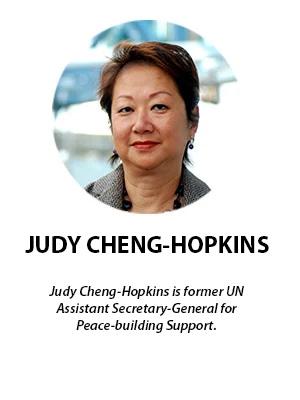
Women continue to play a minor role in dealing with matters that affect them, sometimes disproportionately more severely than men.
A systematic mapping of the gender of leaders in the world’s 33 most important multilateral organisations by our advocacy group shows that women have held only 12% of the top jobs at these organisations since the end of the Second World War in 1945.
Thirteen of these organisations — including the Asian Development Bank and the three other main regional development banks — have never been led by a woman.
Five have elected a woman president only once in their entire history.
The picture is worse when we look at Southeast Asia. Since 1945, 10 Southeast Asian men – but not a single woman – have held the top job at one of these multilateral organisations.
In East Asia, a total of 29 men, mostly from Japan, have held these jobs, while only four women have been given this responsibility.
This is an affront to millions of capable Asian women, and it flies in the face of the global movement towards transparency, equity and accountability that has brought new credibility to many public and private institutions.
Since multilateral organisations have immense influence over issues that directly affect women’s well-being — from gender-based violence to immigration and healthcare — having more women in power could bring new perspectives and greater urgency to problems that affect half of the global population.
Over the next three years, at least 16 organisations in the multilateral system will hold elections.
One of them is the Food and Agriculture Organisation, which is expected to re-elect Qu Dongyu, one of three candidates — all men — as director-general.
Since this organisation was founded, it has had nine directors-general – all of them men.
Although multilateral organisations are structurally resistant to change, we believe the shameful tradition of gender inequality will end when they feel pressure from three fronts simultaneously.
First, ordinary citizens must demand that their governments nominate qualified women candidates and representatives to international organisations.
In the run-up to the last election of the UN Secretary-General in 2016, some 750 civil society organisations around the world signed statements in support of a more transparent process that would include qualified women candidates.
As a result, an unprecedented seven of the thirteen official candidates for the post were women.
Although Antonio Guterres ultimately won the vote, these efforts established a new baseline for balanced elections.
Second, the governments that control these organisations must demand a complete overhaul of governance systems.
Calls to reform the UN have been building up for decades for fundamentally geopolitical reasons, since rules and voting structures created during the Cold War unfairly favour a handful of powerful governments.
But gender equality offers a way to kick-start this broader reform agenda and quickly restore some legitimacy to these agencies.
The president of the UN General Assembly, for example, is elected each year and the position is rotated among the many regions around the world.
Why not also have a system that alternates between men and women for the post of president every other term?
And who would object to a rule requiring the governing bodies of all UN organisations to be gender balanced?
Finally, the management of multilateral organisations must dismantle any remaining internal barriers to the advancement of women professionals.
A few have already made much progress on this front by setting targets for the promotion of women to higher grades or by participating in independent gender certifications.
But much more can be done to ensure that the pipelines of future management talent include a proportionate share of women.
The multilateral system needs more leaders from the Global South, and it is surely time for talented women from Southeast and East Asia to lead some of these 33 multilateral organisations.
Together, we have a chance to bring fresh thinking and renewed trust to international cooperation at a time when it is desperately needed. - FMT
The writer is a member of GWL Voices, an advocacy group for multi-lateralism and gender equality made up of 62 global women leaders.
The views expressed are those of the writer and do not necessarily reflect those of MMKtT.


No comments:
Post a Comment
Note: Only a member of this blog may post a comment.